茶文化讲座自己翻译的修订版
茶文化英语带翻译

For foreigners who want to work in tea houses, it is also crucial to learn some common phrases and basic communication skills used in tea houses. This article will introduce some commonly used English expressions in tea houses, as well as some practical communication skills, to help readers better understand and apply English in tea houses.
由于茶楼的特殊环境和特色,茶楼英语的学习和应用有其独特之处。通过不断学习和积累经验,茶楼从业人员可以更好地掌握茶楼英语,为促进茶文化的传播和发展做出更大的贡献。
以上就是关于茶楼英语的一些介绍和应用技巧,希望可以帮助到有需要的读者。茶楼作为传统的休闲场所,在融合传统文化和国际交流的过程中,茶楼英语的学习和应用将变得越来越重要。
5. How many people are in your party? 你们几位?
6. Please enjoy your tea. 请慢慢品尝您的茶。
7. Is there anything else I can help you with? 还有什么我可以帮助您的吗?
以上是一些茶楼常用的英语表达,服务员可以通过这些句子与外国客人进行基本的交流。此外,服务员还可以学习一些关于茶的基本知识和制作过程的英语表达,以便能够更好地向客人介绍茶的种类和特点。
中国茶文化讲座英文版

Tea painting is a painting art with tea as the theme, expressing the charm and beauty of tea through brush and ink. Chinese tea painting has a long history and diverse styles, from Wang Wei's "Tea Battle" in the Tang Dynasty to modern artists' tea paintings, all of which demonstrate the profound connotation of tea culture.
Chinese Tea and Literature and Art
CATALOGUE
03
Tea poetry is a literary form in ancient China where literati and ink scholars sang about tea and expressed their emotions. Starting from Lu Yu's "Classic of Tea" in the Tang Dynasty, tea poetry gradually developed into an independent literary genre, and many famous tea poetry works have been left by literati throughout history.
Chinese Tea Ceremony and Etiquette
英文版茶文化的简介

英文版茶文化的简介茶文化是我们中国文化的一部分,现在已在世界广泛传播,下面是店铺精心为你整理的英文版茶文化的简介,一起来看看。
英文版茶文化的简介The Chinese people, in their drinking of tea, place much significance on the act of "savoring." "Savoring tea" is not only a way to discern good tea from mediocre tea, but also how people take delight in their reverie and in tea-drinking itself. Snatching a bit of leisure from a busy schedule, making a kettle of strong tea, securing a serene space, and serving and drinking tea by yourself can help banish fatigue and frustration, improve your thinking ability and inspire you with enthusiasm. You may also imbibe it slowly in small sips to appreciate the subtle allure of tea-drinking, until your spirits soar up and up into a sublime aesthetic realm. Buildings, gardens, ornaments and tea sets are the elements that form the ambience for savoring tea. A tranquil, refreshing, comfortable and neat locale is certainly desirable for drinking tea. Chinese gardens are well known in the world and beautiful Chinese landscapes are too numerous to count. T eahouses tucked away in gardens and nestled beside the natural beauty of mountains and rivers are enchanting places of repose for people to rest and recreate themselves.China is a country with a time-honored civilization and a land of ceremony and decorum. Whenever guests visit, it is necessary to make and serve tea to them. Before serving tea, you may ask them for their preferences as to what kind of tea they fancy and serve them the tea in the most appropriate teacups. In the course of serving tea, the host should take careful note of how much water is remaining in the cups and in the kettle. Usually, if the teais made in a teacup, boiling water should be added after half of the cup has been consumed; and thus the cup is kept filled so that the tea retains the same bouquet and remains pleasantly warm throughout the entire course of tea-drinking. Snacks, sweets and other dishes may be served at tea time to complement the fragrance of the tea and to allay one's hunger.中国人饮茶,注重一个"品"字。
中国茶文化讲座英文版PPT课件
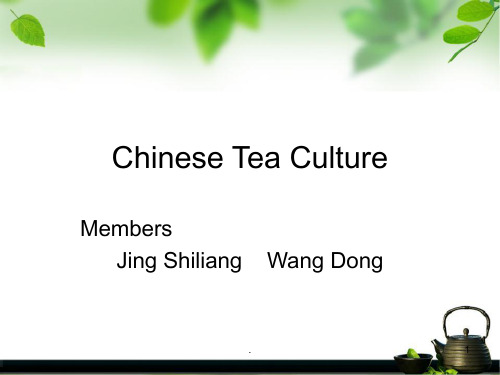
.
14
Huangshan maofeng tea
• green tea • birthplace:Mount
Huang,Anhui Province • one of the ten most fam
.
7
White tea
• slightly fermented (20%-30%)
• white leaves looking like silver color
.
8
Oolong tea
• half fermented (30%60%)
• golden tea water and dark green leaves
.
2
The origin of Chinese tea
.
3
The origin of Chinese tea
.
4
Classification of tea
• Green tea • Yellow tea • White tea • Oolong tea • Black tea • Dark tea
.
12
West Lake Longjing tea
• green tea • birthplace:Hangzhou,Zhejiang Province • one of the ten most famous teas in China
.
13
Dongting biluochun tea
• green tea • birthplace:Dongting
茶文化英语演讲稿
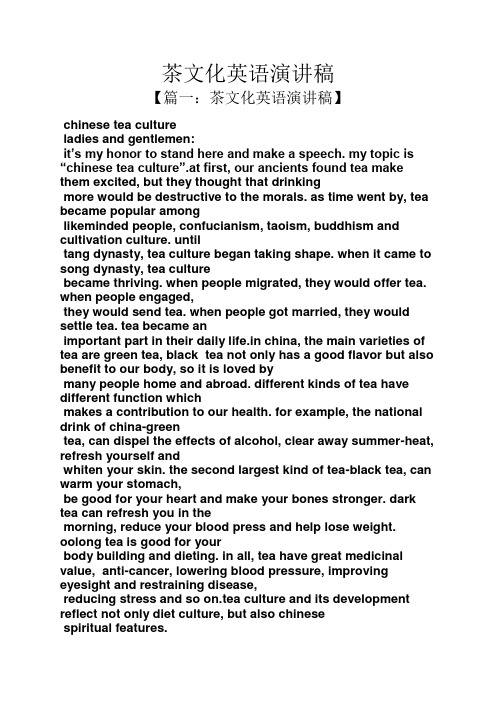
茶文化英语演讲稿【篇一:茶文化英语演讲稿】chinese tea cultureladies and gentlemen:it’s my honor to stand here and make a speech. my topic is “chinese tea culture”.at first, our ancients found tea make them excited, but they thought that drinkingmore would be destructive to the morals. as time went by, tea became popular amonglikeminded people, confucianism, taoism, buddhism and cultivation culture. untiltang dynasty, tea culture began taking shape. when it came to song dynasty, tea culturebecame thriving. when people migrated, they would offer tea. when people engaged,they would send tea. when people got married, they would settle tea. tea became animportant part in their daily life.in china, the main varieties of tea are green tea, black tea not only has a good flavor but also benefit to our body, so it is loved bymany people home and abroad. different kinds of tea have different function whichmakes a contribution to our health. for example, the national drink of china-greentea, can dispel the effects of alcohol, clear away summer-heat, refresh yourself andwhiten your skin. the second largest kind of tea-black tea, can warm your stomach,be good for your heart and make your bones stronger. dark tea can refresh you in themorning, reduce your blood press and help lose weight. oolong tea is good for yourbody building and dieting. in all, tea have great medicinal value, anti-cancer, lowering blood pressure, improving eyesight and restraining disease,reducing stress and so on.tea culture and its development reflect not only diet culture, but also chinesespiritual features.china is a country with a time-honored civilization and a land of ceremony anddecorum. whenever guests visit, it is necessary to make and serve tea to them. beforeserving tea, you may ask them for their preferences as to what kind of tea they fancyand serve them the tea in the most appropriate teacups. in the course of serving tea,the host should take careful note of how much water is remaining in the cups and inthe kettle. usually, if the tea is made in a teacup, boiling water should be addedafter half of the cup has been consumed; and thus the cup is kept filled so that thetea retains the same bouquet and remains pleasantly warm. tea culture plays an indispensable role in promoting the international culturalexchange between china and other countries, eiching chinese cultural life andpromoting chinese spiritual civilization construction. in conclusion, tea culture is one of the essences of chinese culture in the history.the spirit of tea permeates the court and society, into the chinese poetry, painting,calligraphy, religion, medicine. for thousands of years china has not onlyaccumulated a great deal about tea cultivation, production of material culture, butalso accumulated rich spirit of the tea culture, which is unique to chinas tea culture.thank you!篇二:中国茶文化英语演讲稿chinese tea culture中国的茶文化ladies and gentlemen:it’s my honor to stand here and make a speech. my topic is “chinese tea culture”.这是我的荣幸站在这里做一个演讲。
中国茶文化讲座英文版
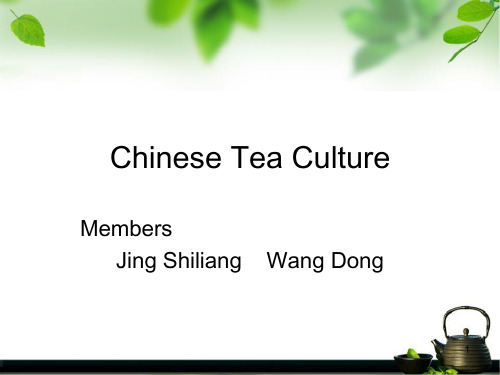
• 1993,Hangzhou, “China International Tea Culture”
• 1998,China International Tea Cultural Exchange Center
19
Thank You
20
18
The development of modern tea
culture
• 1982,Hangzhou,”tea house” social group
• 1983,Hubei,”Lu Yu Tea Culture”
• 1990,Beijing,”Association of Chinese tea”
12
West Lake Longjing tea
• green tea • birthplace:Hangzhou,Zhejiang Province • one of the ten most famous teas in China
13
Dongting biluochun tea
• green tea • birthplace:Dongting
9
Black tea
• Fermented(80%-90%) • largest consumption
in the world • red tea water and
leaves • color of dry black tea
is red with black
10
Dark tea
• post-fermentation (100%)
mountain,Jiangsu Province • one of the ten most fa mous teas in China
中国茶文化(精美中双语版)
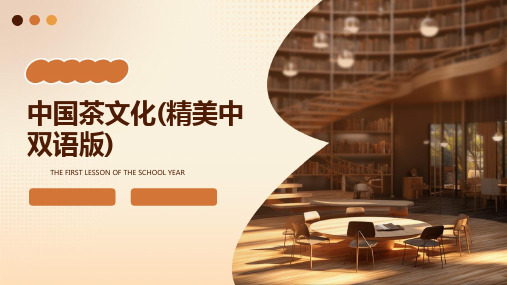
种传承方式强调实践和经验的积累。
书籍记载
03
古代茶书如《茶经》等,为后人提供了丰富的茶文化知识和理
论基础。
茶文化的发展现状与趋势
多元化发展
随着全球化的推进,中国茶文化正逐渐走向世界,与不同文化进 行交流和融合。
创新发展
在传承传统茶文化的基础上,人们不断进行创新和探索,推动茶 文化向更高层次发展。
科技应用
内涵
包括茶叶品种、茶道礼仪、茶禅一 味、茶与文学、茶与艺术等多方面 的文化元素。
茶文化的发展历程
01
02
03
起源
起源于神农氏时期,作为 药用植物被发现。
发展
经历唐、宋、元、明、清 等朝代的发展,逐渐融入 人们形成和 完善,成为中华文化的重 要组成部分。
茶具的选购与保养
选购要点 注重材质、工艺和实用性,选择适合 自己需求的茶具。
保养方法
每次使用后及时清洗,定期消毒;避 免使用硬物刮擦;存放在干燥通风处。
收藏与鉴赏
对于具有收藏价值的茶具,要妥善保 管,定期保养;了解市场行情和鉴别 真伪的方法。
使用禁忌
避免使用破损或劣质的茶具;注意茶 具的清洁和卫生;不要长时间浸泡茶 叶在茶壶中。
现代科技在茶叶种植、加工、销售等方面得到广泛应用,提高了 茶叶品质和茶文化的影响力。
茶文化的未来展望与挑战
国际化推广
生态保护
文化传承与创新
市场挑战
中国茶文化将继续走向世界, 推动全球茶文化的交流与融合。
在茶叶种植和加工过程中,注 重生态保护和可持续发展,提 高茶叶品质的同时保护环境。
在传承传统茶文化的基础上, 不断进行创新和探索,推动茶 文化向更高层次发展。同时, 注重培养新一代茶文化传承人, 确保茶文化的持续传承和发展。
中国茶文化讲座英文版
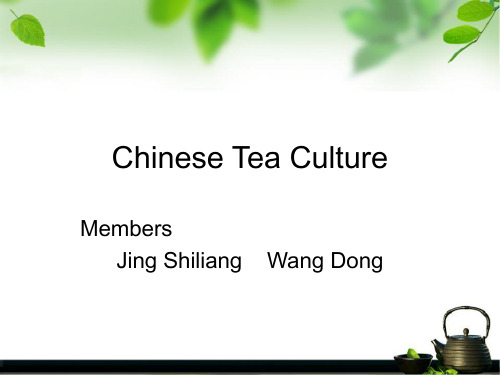
• not fermented(0) • the national drink of China • clear tea water and green leaves
Yellow tea
• slightly fermented (10%-20%) • yellow tea water and leaves
The development of modern tea culture
• 1982,Hangzhou,”tea house” social group • 1983,Hubei,”Lu Yu Tea Culture” • 1990,Beijing,”Association of Chinese tea” • 1991,Hangzhou,China Tea Museum • 1993,Hangzhou, “China International Tea Culture” • 1998,China International Tea Cultural Exchange Center
Some famous tea in China
• • • • • • West Lake Longjing tea Dongting biluochun tea Huangshan maofeng tea Lu’an guapian tea keemun black tea Tieguanyin tea
Black tea
• Fermented(80%-90%) • largest consumption in the world • red tea water and leaves • color of dry black tea is red with black
Dark tea
介绍茶文化的英语作文带翻译
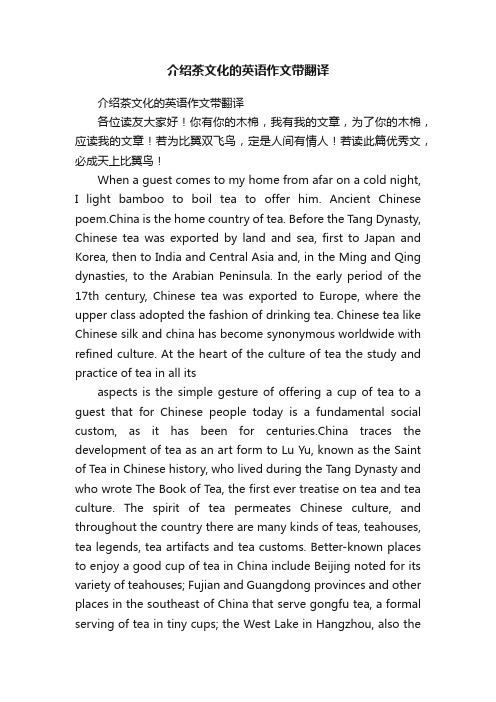
介绍茶文化的英语作文带翻译介绍茶文化的英语作文带翻译各位读友大家好!你有你的木棉,我有我的文章,为了你的木棉,应读我的文章!若为比翼双飞鸟,定是人间有情人!若读此篇优秀文,必成天上比翼鸟!When a guest comes to my home from afar on a cold night, I light bamboo to boil tea to offer him. Ancient Chinese poem.China is the home country of tea. Before the Tang Dynasty, Chinese tea was exported by land and sea, first to Japan and Korea, then to India and Central Asia and, in the Ming and Qing dynasties, to the Arabian Peninsula. In the early period of the 17th century, Chinese tea was exported to Europe, where the upper class adopted the fashion of drinking tea. Chinese tea like Chinese silk and china has become synonymous worldwide with refined culture. At the heart of the culture of tea the study and practice of tea in all itsaspects is the simple gesture of offering a cup of tea to a guest that for Chinese people today is a fundamental social custom, as it has been for centuries.China traces the development of tea as an art form to Lu Yu, known as the Saint of Tea in Chinese history, who lived during the Tang Dynasty and who wrote The Book of Tea, the first ever treatise on tea and tea culture. The spirit of tea permeates Chinese culture, and throughout the country there are many kinds of teas, teahouses, tea legends, tea artifacts and tea customs. Better-known places to enjoy a good cup of tea in China include Beijing noted for its variety of teahouses; Fujian and Guangdong provinces and other places in the southeast of China that serve gongfu tea, a formal serving of tea in tiny cups; the West Lake in Hangzhou, also thehome of the Tea Connoisseurs Association, noted for its excellent green tea; and provinces insouthwest China like Yunnan where the ethnic groups less affected by foreign cultures retain tea ceremonies and customs in original tea-growing areas.当一个客人从远方来我的家在一个寒冷的晚上,我光吃煮茶给他。
中国茶文化讲座英文

第15页/共20页
keemun black tea
• black tea • birthplace:Qimen,
Anhui Province • one of the ten mos
t famous teas in C hina
第16页/共20页
Tieguanyin tea
• green tea • birthplace:Dongtin
g mountain, Jiangsu Province • one of the ten mos t famous teas in C hina
第13页/共20页
Huangshan maofeng tea
• green tea • birthplace:Mount
• Iron black leaves and red water
第10页/共20页
Some famous tea in China
• West Lake Longjing tea
• Dongting biluochun tea
• Huangshan maofeng tea
• Lu’an guapian tea • keemun black tea
Huang,Anhui Province • one of the ten most famous teas in Chin a
第14页/共20页
Lu’an guapian tea
• green tea • birthplace:Lu’an,A
nhui Province • one of the ten most
第4页/共20页
Green tea
• not fermented(0) • the national drink of
茶文化与汉英翻译PPT文档共75页
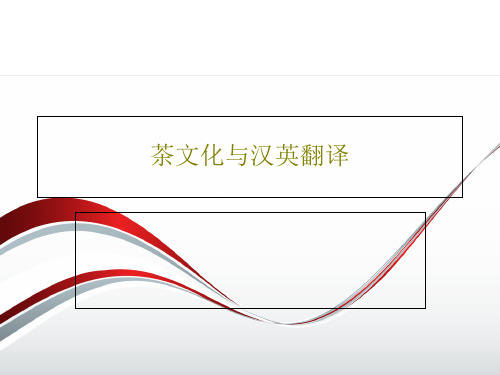
茶文化与汉英翻译
51、山气日夕佳,飞鸟相与还。 52、木欣欣以向荣,泉涓涓而始流。
53、富贵非吾愿,帝乡不可期。 54、雄发指危冠,猛气冲长缨。 55、土地平旷,屋舍俨然,有良田美 池桑竹 之属, 阡陌交 通,鸡 犬相闻 。
谢谢你的阅读
❖ 知识就是财富 ❖ 丰富你的人生
71、既然我已经踏上这条道路,那么,任何东西都不应妨碍我沿着这条路走下去。——康德 72、家庭成为快乐的种子在外也不致成为障碍物但在旅行之际却是夜间的伴侣。——西塞罗 73、坚持意志伟大的事业需要始终不渝的精神。——伏尔泰 74、路漫漫其修道远,吾将上下而求索。——屈原 75、内外相应,言行相称。——韩非
中国茶文化英语演讲稿
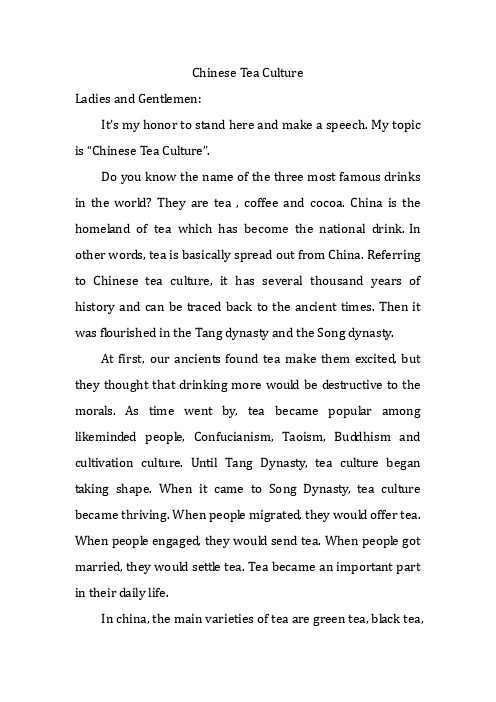
Chinese Tea CultureLadies and Gentl emen:It’s my honor to stand here and make a speech. My topic is “Chinese Tea Culture”.Do you know the name of the three most famous drinks in the world? They are tea , coffee and cocoa. China is the homeland of tea which has become the national drink.In other words, tea is basically spread out from China. Referring to Chinese tea culture, it has several thousand years of history and can be traced back to the ancient times. Then it was flourished in the Tang dynasty and the Song dynasty.At first, our ancients found tea make them excited, but they thought that drinking more woul d be destructive to the morals. As time went by, tea became popular among likeminded people, Confucianism, Taoism, Buddhism and cultivation culture. Until Tang Dynasty, tea culture began taking shape. When it came to Song Dynasty, tea culture became thriving. When peopl e migrated, they woul d offer tea. When peopl e engaged, they woul d send tea. When peopl e got married, they woul d settl e tea. Tea became an important part in their daily life.In china, the main varieties of tea are green tea, black tea,Oolong tea,scented tea, white tea, yell ow tea and dark tea. In the early days, the Chinese boil ed their tea l eaves with water and other ingredients such as salt and ginger; later they ground the dried l eaves to a powder and whipped them up with hot water. It was not until that Ming Dynasty that it became common practice to infuse the l oose tea l eaves in hot water in teapots, and then to pour the infused liquid into bowls to drink. Nowadays, we make different tea in different particular ways. Over the centuries, China developed an extraordinary tea culture, comparable with the wine culture of the West.Tea not only has a good flavor but also benefit to our body, so it is l oved by many peopl e home and abroad. Different kinds of tea have different function which makes a contribution to our health. For example, the national drink of China-green tea, can dispel the effects of al cohol, cl ear away summer-heat, refresh yourself and whiten your skin. The second largest kind of tea-black tea, can warm your stomach, be good for your heart and make your bones stronger. Dark tea can refresh you in the morning, reduce your bl ood press and help l ose weight. Oolong Tea is good for your body building and dieting. In all, tea have great medicinal value,anti-cancer, l owering blood pressure, improving eyesight and restraining disease, reducing stress and so on.Tea culture and its devel opment refl ect not only diet culture, but also Chinese spiritual features.China is a country with a time-honored civilization and a land of ceremony and decorum. Whenever guests visit, it is necessary to make and serve tea to them. Before serving tea, you may ask them for their preferences as to what kind of tea they fancy and serve them the tea in the most appropriate teacups. In the course of serving tea, the host shoul d take careful note of how much water is remaining in the cups and in the kettl e. Usually, if the tea is made in a teacup, boiling water shoul d be ad ded after half of the cup has been consumed; and thus the cup is kept fill ed so that the tea retains the same bouquet and remains pl easantly warm.Tea culture plays an indispensabl e role in promoting the international cultural exchange between China and other countries, enriching Chinese cultural life and promoting Chinese spiritual civilization construction.In conclusion, tea culture is one of the essences of Chinese culture in the history. The spirit of tea permeates the court and society, into the Chinese poetry, painting,calligraphy, religion, medicine. For thousands of years China has not only accumulated a great deal about tea cultivation, production of material culture, but also accumulated rich spirit of the tea culture, which is unique to China's tea culture.Thank you!。
中国茶文化英语演讲稿
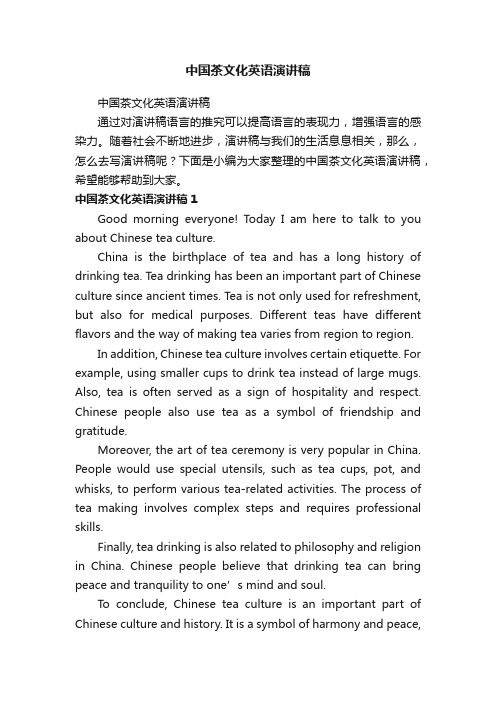
中国茶文化英语演讲稿中国茶文化英语演讲稿通过对演讲稿语言的推究可以提高语言的表现力,增强语言的感染力。
随着社会不断地进步,演讲稿与我们的生活息息相关,那么,怎么去写演讲稿呢?下面是小编为大家整理的中国茶文化英语演讲稿,希望能够帮助到大家。
中国茶文化英语演讲稿1Good morning everyone! Today I am here to talk to you about Chinese tea culture.China is the birthplace of tea and has a long history of drinking tea. Tea drinking has been an important part of Chinese culture since ancient times. Tea is not only used for refreshment, but also for medical purposes. Different teas have different flavors and the way of making tea varies from region to region.In addition, Chinese tea culture involves certain etiquette. For example, using smaller cups to drink tea instead of large mugs. Also, tea is often served as a sign of hospitality and respect. Chinese people also use tea as a symbol of friendship and gratitude.Moreover, the art of tea ceremony is very popular in China. People would use special utensils, such as tea cups, pot, and whisks, to perform various tea-related activities. The process of tea making involves complex steps and requires professional skills.Finally, tea drinking is also related to philosophy and religion in China. Chinese people believe that drinking tea can bring peace and tranquility to one’s mind and soul.To conclude, Chinese tea culture is an important part of Chinese culture and history. It is a symbol of harmony and peace,as well as a spiritual nourishment. Thank you for listening.中国茶文化英语演讲稿2Good morning ladies and gentlemen, I am here today to talk to you about Chinese tea culture. Since ancient times, Chinese people have had a special relationship with tea. Tea drinking is deeply embedded in Chinese culture, and it is seen as a way of life.There are many kinds of tea in China, such as green tea, black tea, oolong tea, white tea, and Pu’er tea. Each type of tea has its own unique flavor and properties. Apart from refreshment, Chinese people also believe that drinking tea can help improve health and prevent disease.In addition, tea drinking is also associated with etiquette. Chinese people usually serve tea to visitors as a sign of hospitality. There are also various tea ceremonies and rituals, such as the Gongfu Cha ceremony. This ceremony requires special utensils and involves complex procedures. Furthermore, tea drinking is also related to philosophy and religion in China. Chinese people believe that tea can bring peace and tranquility to one’s mind and soul. Tea is also used as a symbolic gesture to show respect and appreciation.To sum up, Chinese tea culture is an important part of Chinese culture and history. It is a symbol of harmony and peace, as well as a spiritual nourishment. Thank you for listening.中国茶文化英语演讲稿3Good morning ladies and gentlemen, Today I am here to talk to you about Chinese tea culture. Tea is an important part of Chinese culture and has been enjoyed by Chinese people for centuries.There are many kinds of tea in China, such as green tea, blacktea, oolong tea, white tea, and Pu’er tea. Each type of tea has its own unique flavor and properties. Chinese people not only drink tea for refreshment, but also believe that it can help improve health and prevent disease.In addition, tea drinking is also associated with certain etiquette. For example, using smaller cups to drink tea instead of large mugs. Tea is also often served as a sign of hospitality and respect. Chinese people also use tea as a symbol of friendship and gratitude.Moreover, the art of tea ceremony is very popular in China. People would use special utensils, such as tea cups, pot, and whisks, to perform various tea-related activities. The process of tea making involves complex steps and requires professional skills.Finally, tea drinking is also related to philosophy and religion in China. Chinese people believe that tea can bring peace and tranquility to one’s mind and soul. To conclude, Chinese tea culture is an important part of Chinese culture and history. It is a symbol of harmony and peace, as well as a spiritual nourishment. Thank you for listening.中国茶文化英语演讲稿4Good morning, ladies and gentlemen! Today I am here to talk about Chinese tea culture.China is known as the birthplace of tea and has a long history of drinking tea. As early as 5,000 years ago, people started drinking tea. For thousands of years, people have developed a wide variety of teas with different flavors. Tea drinking has become an important part of Chinese life and culture.In China, tea is not only used for refreshment, but also for medical purposes. Many Chinese believe that tea can helpprevent disease and improve health. In addition, different teas have different tastes and the way of brewing them varies from region to region. Chinese people enjoy drinking tea at all times, such as breakfast or before going to bed.The art of tea ceremony is very popular in China. A tea ceremony involves special utensils, such as tea cups, pot, and whisks. People would use these utensils to perform various tea-related activities such as preparing tea and serving it to guests. The process of tea making involves complex steps and requires professional skills.Tea drinking is also related to philosophy and religion in China. It is believed that tea can bring peace and tranquility to your mind and soul. People also use tea as a gift to express their respect and gratitude.To sum up, Chinese tea culture is deep rooted in Chinese people’s heart. It is a symbol of harmony and peace, as well as a spiritual nourishment. Thank you for listening.中国茶文化英语演讲稿5Good morning ladies and gentlemen, Today I am here to talk to you about Chinese tea culture. Tea drinking is deeply embedded in Chinese culture, and it is seen as a way of life.There are many kinds of tea in China, such as green tea, black tea, oolong tea, white tea, and Pu’er tea. Each type of tea has its own unique flavor and properties. Apart from refreshment, Chinese people also believe that drinking tea can help improve health and prevent disease.In addition, tea drinking is also associated with certain etiquette. For example, using smaller cups to drink tea instead of large mugs. Tea is also often served as a sign of hospitality and respect. Chinese people also use tea as a symbol of friendshipand gratitude.Moreover, the art of tea ceremony is very popular in China. People would use special utensils, such as tea cups, pot, and whisks, to perform various tea-related activities. The process of tea making involves complex steps and requires professional skills.Finally, tea drinking is also related to philosophy and religion in China. Chinese people believe that tea can bring peace and tranquility to one’s mind and soul.To conclude, Chinese tea culture is an important part of Chinese culture and history. It is a symbol of harmony and peace, as well as a spiritual nourishment. Thank you for listening.中国茶文化英语演讲稿6Good morning everyone! Today I would like to talk to you about Chinese tea culture.Chinese tea culture dates back to over 20xx years ago. Tea is an integral part of Chinese culture and has become an indispensable part of many Chinese people’s dail y lives. Chinese people drink tea for refreshment, for medical purposes, or to show respect and hospitality to visitors. There are many kinds of Chinese tea, such as green tea, black tea, white tea, oolong tea, and Pu’er tea. Each type of tea has its own u nique flavor and aroma. Drinking tea is not only a matter of taste, but also of etiquette. Chinese people prefer using small cups to drink tea, instead of drinking from a large mug.In addition, there are countless ways of brewing and serving tea, depending on the type of tea and the occasion. For example, Gongfu Cha is a traditional Chinese tea ceremony often used when serving high-quality tea. During this ceremony, considerable attention is paid to the amount of tea leaves used,the temperature of the water, and the number of steepings.Moreover, tea plays an important role in Chinese philosophy and religion. Chinese people believe that tea can help them relax and gain insight into the universe. Most importantly, tea is a symbol of friendship and respect.To conclude, Chinese tea culture is a rich and diverse tradition that has been passed down from generation to generation. I hope that byunderstanding and appreciating Chinese tea culture, we can all enjoy a cup of tea together in peace and harmony. Thank you for your attention.。
中国茶道英文版翻译
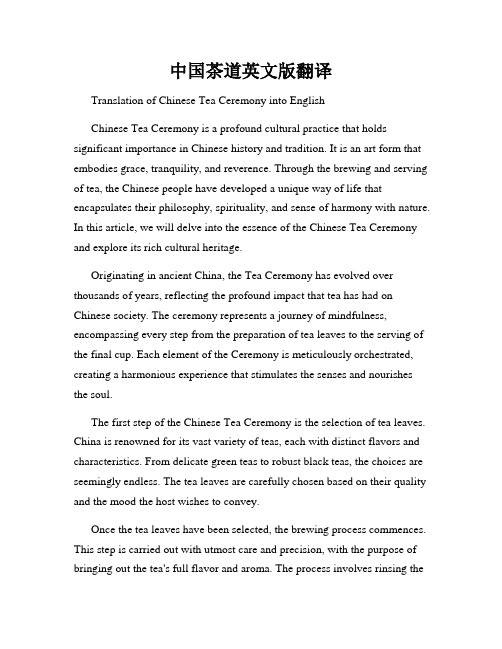
中国茶道英文版翻译Translation of Chinese Tea Ceremony into EnglishChinese Tea Ceremony is a profound cultural practice that holds significant importance in Chinese history and tradition. It is an art form that embodies grace, tranquility, and reverence. Through the brewing and serving of tea, the Chinese people have developed a unique way of life that encapsulates their philosophy, spirituality, and sense of harmony with nature. In this article, we will delve into the essence of the Chinese Tea Ceremony and explore its rich cultural heritage.Originating in ancient China, the Tea Ceremony has evolved over thousands of years, reflecting the profound impact that tea has had on Chinese society. The ceremony represents a journey of mindfulness, encompassing every step from the preparation of tea leaves to the serving of the final cup. Each element of the Ceremony is meticulously orchestrated, creating a harmonious experience that stimulates the senses and nourishes the soul.The first step of the Chinese Tea Ceremony is the selection of tea leaves. China is renowned for its vast variety of teas, each with distinct flavors and characteristics. From delicate green teas to robust black teas, the choices are seemingly endless. The tea leaves are carefully chosen based on their quality and the mood the host wishes to convey.Once the tea leaves have been selected, the brewing process commences. This step is carried out with utmost care and precision, with the purpose of bringing out the tea's full flavor and aroma. The process involves rinsing thetea leaves, pouring hot water over them, and allowing the leaves to infuse. The infusion time is precise, as different types of tea require varying durations to achieve an optimal taste.As the tea brews, the host prepares the tea set, a collection of utensils that are used in the ceremony. Each piece is intricately designed and holds symbolic meaning. The most prominent utensils are the teapot, tea cups, and tea tray. These items are chosen for their aesthetic appeal and functionality, enhancing the overall experience of the Tea Ceremony.Once the tea has finished brewing, the host begins the ritual of serving the tea. This involves pouring the tea into small cups, each placed on a wooden or bamboo tray. The host holds the tray with both hands and offers the cups to the guests, demonstrating respect and gratitude. The guests receive the tea with appreciation, savoring each sip, and engaging in conversation. This part of the Ceremony is a time for connection, reflection, and shared enjoyment of the tea's flavors.Throughout the Tea Ceremony, specific etiquette and rituals are observed. For example, guests should never point the spout of the teapot towards others, as it is considered impolite. Additionally, it is customary for guests to hold the tea cup with both hands when receiving it from the host, expressing gratitude and respect for the tea and its maker. These etiquettes reflect the traditional values of Chinese culture, emphasizing harmony, respect, and mindfulness.The Chinese Tea Ceremony serves as a profound reminder of the beauty and simplicity of life. It reminds us to slow down, appreciate the present moment, and find tranquility amidst the chaos of modernity. Through itsintricate rituals and sensory experience, the Tea Ceremony offers a retreat from the fast-paced world, allowing individuals to reconnect with themselves and others.In conclusion, the Chinese Tea Ceremony is an important cultural practice that has captivated people worldwide. Its translation into English encompasses the essence of the ceremony while honoring the cultural heritage it represents. Through its meticulous preparation, graceful serving, and meaningful interactions, the Tea Ceremony invites us to experience serenity and mindfulness. It is a timeless tradition that continues to inspire and nourish both body and soul.。
中国茶文化英语演讲稿3篇
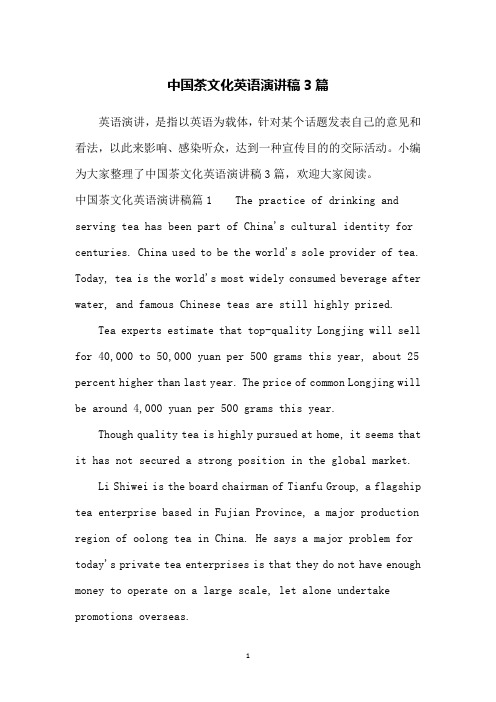
中国茶文化英语演讲稿3篇英语演讲,是指以英语为载体,针对某个话题发表自己的意见和看法,以此来影响、感染听众,达到一种宣传目的的交际活动。
小编为大家整理了中国茶文化英语演讲稿3篇,欢迎大家阅读。
中国茶文化英语演讲稿篇1 The practice of drinking and serving tea has been part of China's cultural identity for centuries. China used to be the world's sole provider of tea. Today, tea is the world's most widely consumed beverage after water, and famous Chinese teas are still highly prized.Tea experts estimate that top-quality Longjing will sell for 40,000 to 50,000 yuan per 500 grams this year, about 25 percent higher than last year. The price of common Longjing will be around 4,000 yuan per 500 grams this year.Though quality tea is highly pursued at home, it seems that it has not secured a strong position in the global market.Li Shiwei is the board chairman of Tianfu Group, a flagship tea enterprise based in Fujian Province, a major production region of oolong tea in China. He says a major problem for today's private tea enterprises is that they do not have enough money to operate on a large scale, let alone undertake promotions overseas."Most of China's tea enterprises are non-state-owned with lack of funding being their weakest point. We are glad to see that Minsheng Bank is now offering a special loan program for tea enterprises. We hope more banks in China will give us more support in terms of financing."Li Jiaxun, board chairman of Zhejiang Tea Group, China's largest exporter of green tea, says a lack of widely recognized brand names is holding Chinese tea exports back and squeezing the industry's profit margin.Li cites his own company as an example. The group mainly sells tea as a raw material rather than a branded product. As a result, its profit margin is only about 5 percent, and sometimes even lower.The tea expert adds that Chinese companies should also adapt to the needs of western customers, who might prefer black tea to green, and teabags to loose-leaf teas.Wen Zhongliang, deputy director of the Foreign Trade Department under the Ministry of Commerce, says it is an urgent task for Chinese tea producers and sellers to build up the image of Chinese tea abroad to boost tea exports."In addition to ensuring the high quality of Chinese tea, tea enterprises in the country should promote the image ofChinese tea together. It could be something of an effort to explain the cultural significance and health benefits of tea to foreigners, but once they realize that, they will find it fascinating."The trade official suggests that existing networks such as the Confucius Institutes be used to spread China's tea culture around the world.For CRI, this is Su Yi.中国茶文化英语演讲稿篇2 The Chinese people, in their drinking of tea, place much significance on the act of "savoring." "Savoring tea" is not only a way to discern good tea from mediocre tea, but also how people take delight in their reverie and in tea-drinking itself. Snatching a bit of leisure from a busy schedule, making a kettle of strong tea, securing a serene space, and serving and drinking tea by yourself can help banish fatigue and frustration, improve your thinking ability and inspire you with enthusiasm.You may also imbibe it slowly in small sips to appreciate the subtle allure of tea-drinking, until your spirits soar up and up into a sublime aesthetic realm. Buildings, gardens, ornaments and tea sets are the elements that form the ambience for savoring tea. A tranquil, refreshing, comfortable and neatlocale is certainly desirable for drinking tea. Chinese gardens are well known in the world and beautiful Chinese landscapes are too numerous to count. Teahouses tucked away in gardens and nestled beside the natural beauty of mountains and rivers are enchanting places of repose for people to rest and recreate themselves.China is a country with a time-honored civilization and a land of ceremony and decorum. Whenever guests visit, it is necessary to make and serve tea to them. Before serving tea, you may ask them for their preferences as to what kind of tea they fancy and serve them the tea in the most appropriate teacups. In the course of serving tea, the host should take careful note of how much water is remaining in the cups and in the kettle. Usually, if the tea is made in a teacup, boiling water should be added after half of the cup has been consumed; and thus the cup is kept filled so that the tea retains the same bouquet and remains pleasantly warm throughout the entire course of tea-drinking. Snacks, sweets and other dishes may be served at tea time to complement the fragrance of the tea and to allay one's hunger.中国茶文化英语演讲稿篇3 Ladies and Gentlemen: It’s my honor to stand here and make a speech. My topicis “Chinese Tea Culture”.Do you know the name of the three most famous drinks in the world? They are tea , coffee and cocoa. China is the homeland of tea which has become the national drink. In other words, tea is basically spread out from China. Referring to Chinese tea culture, it has several thousand years of history and can be traced back to the ancient times. Then it was flourished in the Tang dynasty and the Song dynasty.At first, our ancients found tea make them excited, but they thought that drinking more would be destructive to the morals. As time went by, tea became popular among likeminded people, Confucianism, Taoism, Buddhism and cultivation culture. Until Tang Dynasty, tea culture began taking shape. When it came to Song Dynasty, tea culture became thriving. When people migrated, they would offer tea. When people engaged, they would send tea. When people got married, they would settle tea. Tea became an important part in their daily life.In china, the main varieties of tea are green tea, black tea, Oolong tea, scented tea, white tea, yellow tea and dark tea. In the early days, the Chinese boiled their tea leaves with water and other ingredients such as salt and ginger; later they ground the dried leaves to a powder and whipped them up withhot water. It was not until that Ming Dynasty that it became common practice to infuse the loose tea leaves in hot water in teapots, and then to pour the infused liquid into bowls to drink. Nowadays, we make different tea in different particular ways. Over the centuries, China developed an extraordinary tea culture, comparable with the wine culture of the West.Tea not only has a good flavor but also benefit to our body, so it is loved by many people home and abroad. Different kinds of tea have different function which makes a contribution to our health. For example, the national drink of China-green tea, can dispel the effects of alcohol, clear away summer-heat, refresh yourself and whiten your skin. The second largest kind of tea-black tea, can warm your stomach, be good for your heart and make your bones stronger. Dark tea can refresh you in the morning, reduce your blood press and help lose weight. Oolong Tea is good for your body building and dieting. In all, tea have great medicinal value, anti-cancer, lowering blood pressure, improving eyesight and restraining disease, reducing stress and so on.Tea culture and its development reflect not only diet culture, but also Chinese spiritual features.China is a country with a time-honored civilization and aland of ceremony and decorum. Whenever guests visit, it is necessary to make and serve tea to them. Before serving tea, you may ask them for their preferences as to what kind of tea they fancy and serve them the tea in the most appropriate teacups. In the course of serving tea, the host should take careful note of how much water is remaining in the cups and in the kettle. Usually, if the tea is made in a teacup, boiling water should be added after half of the cup has been consumed; and thus the cup is kept filled so that the tea retains the same bouquet and remains pleasantly warm.Tea culture plays an indispensable role in promoting the international cultural exchange between China and other countries, enriching Chinese cultural life and promoting Chinese spiritual civilization construction. In conclusion, tea culture is one of the essences of Chinese culture in the history. The spirit of tea permeates the court and society, into the Chinese poetry, painting, calligraphy, religion, medicine. For thousands of years China has not only accumulated a great deal about tea cultivation, production of material culture, but also accumulated rich spirit of the tea culture, which is unique to China's tea culture.Thank you!---来源网络整理,仅供参考。
中国茶文化讲座英文版

The origin of Chinese tea
The origin of Chinese tea
Classification of tea
• • • • • • Green tea Yellow tea White tea Oolong tea Black tea Dark tea
Green tea
West Lake Longjing tea
• green tea • birthplace:Hangzhou,Zhejiang Province • one of the ten most famous teas in China
Dongting biluochun tea
• green tea • birthplace:Dongting mountain,Jiangsu Province • one of the ten most fa mous teas in China
White tea
• slightly fermented (20%-30%) • white leaves looking like silver color
Oolong tea
• half fermented (30%60%) • golden tea water and dark green leaves
Thank You
Some famous tea in China
• • • • • • West Lake Longjing tea Dongting biluochun tea Huangshan maofeng tea Lu’an guapian tea keemun black tea Tieguanyin tea
• not fermented(0) • the national drink of China • clear tea water and green leaves
- 1、下载文档前请自行甄别文档内容的完整性,平台不提供额外的编辑、内容补充、找答案等附加服务。
- 2、"仅部分预览"的文档,不可在线预览部分如存在完整性等问题,可反馈申请退款(可完整预览的文档不适用该条件!)。
- 3、如文档侵犯您的权益,请联系客服反馈,我们会尽快为您处理(人工客服工作时间:9:00-18:30)。
茶文化讲座自己翻译的修订版IBMT standardization office【IBMT5AB-IBMT08-IBMT2C-ZZT18】各位来宾、各位朋友,欢迎大家参加本次中国茶文化普及讲座。
今天,我想跟大家一起谈谈中国的茶文化。
关于中国茶文化有一个传说,茶是炎帝神农偶然发现的。
Distinguished guests and friends, welcome to this lecture for universalization on the Chinese tea culture. Today I am going to talk about the Chinese tea culture together with you. Legend has it that tea was discovered accidentally by Emperor Yandi, Shennong.一天,他在树下烧水,突然间发现远处一只野兔。
于是,他就去追那只野兔,但没追着。
回来的时候,他发现一些树叶掉进了他烧开的水中,水已变淡黄。
神农追赶野兔而累出一身汗,口干舌燥,尝了一口泛黄的开水,顿时口舌生津,精神一振。
由此,泡茶的传统就流传下来了。
不管传说是真是假,不可否认的是,中国是茶文化的故乡。
One day, he was boiling water under a tree, and then he saw a hare in the distant. And he went to chase the hare, but he failed. When he came back, he found some leaves in the boiled water which had turned to light yellow. He was in a sweat after chasing the hare. His throat was dry and he was really thirsty. Drinking some lightly yellow water, he felt refreshed at once and it was sweet to soul. The tradition of making tea has been handed down from then on. No matter the legend is true or not, China is undeniably the hometown of tea culture.早在唐代,中国的茶叶就通过陆路及海运的方式远销各地。
于是,茶文化也随之传到了日本,韩国,印度,中亚和阿拉伯半岛等地区。
在17世纪初期,中国茶叶远销至欧洲各国,很多上层社会的名流贵族都渐渐养成了喝茶的习惯。
中国人饮茶,最注重一个“品”字。
品茶不仅是鉴别茶之优劣,也有领略饮茶情趣,遐思神往之意。
Chinese tea has been sold to all over the world by sea or land freight as far back as Tang Dynasty. As a result, the tea culture has spread to many districts including Japan, Korea, India, Central Asia and Arabian Peninsula.In the early 17th century, Chinese tea was sold well to European countries. Many celebrities or aristocrats from upper classes gradually fell into thehabit of drinking tea. For Chinese the most important thing of drinking tea is to taste it. To taste tea is not merely to separate the wheat from the chaffbut also to enjoy the pleasure and excite the fancy.中国人喜欢在闲暇时择雅静之处,泡一壶茶,自斟自饮,借以消除疲劳,陶怡心情,振奋精神。
中国茶文化不光只管喝茶本身,还涉及喝茶的环境,如建筑、园林、摆设、茶具等。
In the spare time, Chinese prefer making a pot of tea and drinking italone in a tranquil and secluded place to relieve fatigue, please themselves and cheering up. The Chinese tea culture is not just about drinking tea itself but also the environment of drinking such as architecture, gardens, decoration, tea sets and so on.品茶要求外部环境安静幽雅,舒适赏心。
这种由外至内、由内至外的品茶文化是中国人养身的最好体现。
中国是古老的茶都,也是礼仪之邦,茶自然成为招待客人的最好选择。
家中凡有客人来访,沏茶、敬茶的礼节是必不可少的。
主人可征求客人的意见,选用最合来客口味的茶叶和最佳茶具待客。
The surrounding environment for enjoying tea should be peaceful, elegant, comfortable and pleasing. This culture of tasting tea containing the ins and outs is the very soul of Chinese self-cultivation.(The thought of Chinese self-cultivation is best represented by thisculture of tasting tea consisting of external side and internal side.) China is an ancient land of tea as well as a state of ceremonies where tea is the best choice to serve guests. When Chinese have visitors at their home, making tea and serving tea for them are indispensable. The host can ask whatthe guests will like to have and choose the tea pleasing to their taste andthe best tea set.主人在陪伴客人饮茶时,要注意客人杯中的茶水剩余量。
一般用茶杯泡茶,如已喝去一半,就要添加开水,随喝随添,使茶水浓度基本保持前后一致,水温适宜。
在饮茶时,也可适当佐以茶食,糖果,菜肴等,达到调节口味之效果。
常言道,开门七件事,柴米油盐酱醋茶,可见茶已成为中国人生活的很重要的一部分。
When the host drinks tea with his guests, he should give heed to how much tea remains in their cups. If the tea is made with cups, the cups should be filled with boiled water when it’s half full. As they are drinking, the host keeps filling their cups to keep the same strength and appropriate temperature. In order to bring out the flavor, tea can be served with snacks, candies anddishes. As the saying goes, firewood, rice, oil, salt, sauce, vinegar and tea are indispensable in every home. Therefore, tea has become an important part of Chinese life.茶本身存在着一种从形式到内容,从物质到精神,从人与物的直接关系,到成为人际关系的媒介,逐渐形成传统东方文化一朵奇葩--中国茶文化。
茶的特殊自然功能使茶文化在中国优秀传统文化中占有重要的一席之地。
Tea itself, which bears the direct connection between form and content, material and spirit as well as men and things, is a media for theinterpersonal relationship and is becoming a brilliant flower of oriental traditional culture --Chinese tea culture. With the specially natural function of tea, tea culture won its place in the Chinese traditional culture.。
